|
|
|
Sort Order |
|
|
|
Items / Page
|
|
|
|
|
|
|
| Srl | Item |
| 1 |
ID:
086225


|
|
|
|
|
| Publication |
2009.
|
| Summary/Abstract |
The realities of climate change are unsettling and define to a great extent the challenges of the twenty-first century. The pressures of living in an age of risk are high with diverse constituencies now involved in the development of climate policy. Policy responses to the prospect of climate change, in particular capping carbon emission, will dominate negotiations and determine the structure of a new regime that is universally ratified and comes into force by 2012.
|
|
|
|
|
|
|
|
|
|
|
|
|
|
|
|
| 2 |
ID:
108989
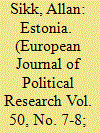

|
|
|
| 3 |
ID:
121787
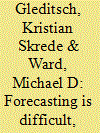

|
|
|
|
|
| Publication |
2013.
|
| Summary/Abstract |
Prediction is an important goal in the study of international conflict, but a large body of research has found that existing statistical models generally have disappointing predictive abilities. We show that most efforts build on models unlikely to be helpful for prediction. Many models essentially ignore the origins of conflict; studies look either at invariant structural features believed to affect the opportunities of conflict, or at factors that are believed to reduce the baseline risk of conflict, without attempting to identify the potential motivations and contentious issues over which conflicts typically arise. Researchers that have considered how contentious issues may motivate conflict and how these can be managed, using the Issues Correlates of War (ICOW) data, have not considered how these features may inform prediction. We assess the risk of dyadic interstate conflict based on the presence of specific contentious issues and conflict management events that may change the conflict potential of these contentious issues. We evaluate to what extent incorporating contentious issues and conflict management can help improve out-of-sample forecasting, as well as advance our understanding of conflict dynamics. Our results provide strong support for the idea that taking into account contentious issues can inform and improve out-of-sample forecasting.
|
|
|
|
|
|
|
|
|
|
|
|
|
|
|
|
| 4 |
ID:
113951
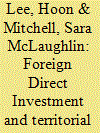

|
|
|
|
|
| Publication |
2012.
|
| Summary/Abstract |
This study evaluates the relationship between foreign direct investment (FDI) and interstate conflict, focusing on four prominent causal mechanisms: the declining benefits of territorial conquest, increasing preference similarity, increasing opportunity costs of violence, and improved information signaling. Empirical analyses show that new territorial issues are less likely to arise as global levels of FDI increase, although monadic and bilateral FDI flows have no effect on states' decisions to start new issue claims. Higher bilateral FDI flows between two disputants significantly reduce the chances for escalation to high levels of violence over issues and improve the chances for peaceful management. Increasing global levels of FDI also reduce the chances for severe militarized conflicts. Opportunity costs are an important mechanism linking FDI and states' conflict management practices, as the pacifying effect of bilateral and monadic FDI on militarized conflict becomes stronger in dyads with a history of militarization over the issues at stake.
|
|
|
|
|
|
|
|
|
|
|
|
|
|
|
|
| 5 |
ID:
094313
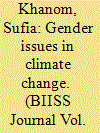

|
|
|
| 6 |
ID:
186819


|
|
|
|
|
| Summary/Abstract |
Because existing issue classification schemes omit prominent issues (e.g., domestic armed conflict) or contain significant within-category heterogeneity, theorizing about the role of issues in international conflict processes has stagnated. Our project jump-starts it again, by independently—and systematically—reconceptualizing and gathering data on five issues connected to dyadic militarized interstate disputes (MIDs) during the period 1900–2010: land (borders), maritime (borders), islands, civil conflict, and coups. After conceptually introducing these issues and embedding them within a larger framework, we describe and apply our MID-Issue data. These efforts show that (i) the MID dataset’s issue classification scheme does not systematically capture our issues, (ii) events in 37.58% of dyadic MIDs connect to domestic armed conflict—a prevalence not on the field’s radar, (iii) some factors promote issue-based international conflict, but only via indirect channels, and (iv) significant value even derives from a further conceptualization of “territorial issues” (broadly defined).
|
|
|
|
|
|
|
|
|
|
|
|
|
|
|
|
| 7 |
ID:
109078
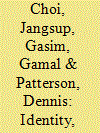

|
|
|
|
|
| Publication |
2011.
|
| Summary/Abstract |
While work on the political behaviour of religious groups in America has shown that, among other things, religious commitment and strong opinions on salient issues can encourage turnout and raise the probability of these groups' members voting in national elections, much less is known about these relationships with respect to Muslim Americans. Using data collected at mosques in 2006 during the holy month of Ramadan, this article maps the turnout patterns of Muslim American respondents and then investigates the factors that explain the political participation of members of this increasingly important religious group. The article focuses on reported turnout in the 2004 presidential election and shows that, more than anything else, strong opinions on salient issues boosted the participation rates of members of this religious group in the election, even when controlling for other factors known to help explain turnout.
|
|
|
|
|
|
|
|
|
|
|
|
|
|
|
|
| 8 |
ID:
084377
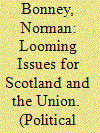

|
|
|
| 9 |
ID:
113430


|
|
|
|
|
| Publication |
2012.
|
| Summary/Abstract |
The European Commission has set renewable energy (RE) targets at the Member State (MS) level, however, at the local scale there are many issues related to renewable energy implementation. In this work, a meta-analysis of European RE generation issues from international scientific literature was carried out. Fifty-four local RE implementation issues were identified. Five main clusters of issues were determined, some were aligned along sectoral lines (e.g., governance and technology) but others were inherently multi-sectoral (e.g., complexity and multiplicity of factors), challenging the traditional sectorial view. Results show that RE issues are not just a finite list of independent issues but are hierarchical, multi-scale and cross-linked. As a further step, these issues clusters were linked to the European RE policy and subsidiarity through the National Renewable Energy Action Plans (NREAP) in selected MS. EU policy and NREAP subsidiarity proved limited in their scope in dealing with local RE issues. With this scope, the way that EU policy partially fails to facilitate delivery of RE targets, promotes weak subsidiarity through NREAPs and does not address local issues of RE, is discussed.
|
|
|
|
|
|
|
|
|
|
|
|
|
|
|
|
|
|
|
|
|